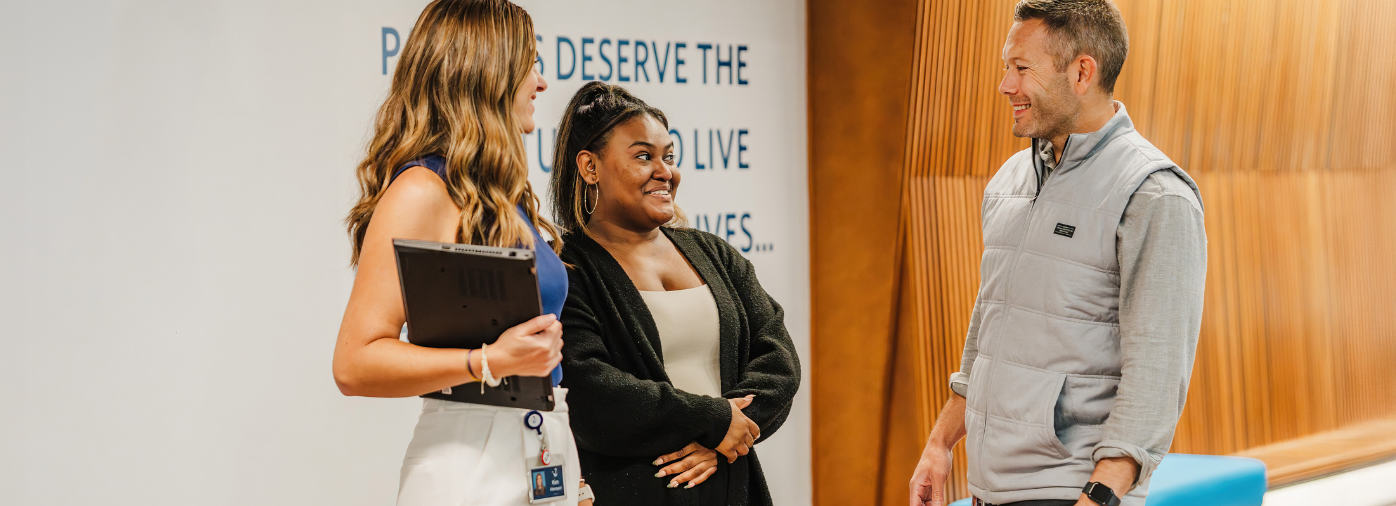
Our News
Challenge Accepted: How Culture Powers Innovation at Alnylam
An interview with Melissa McLaughlin, Alnylam's Chief Human Resources Officer
May 1, 2025
At Alnylam, scientific progress, patient impact, and our people make the impossible possible — because no one understands RNAi the way we do.
Our approach to people and culture is guided by our core values and a firm commitment to inclusivity. These principles, along with a shared ‘challenge accepted’ mentality, fuel life-changing innovation and are the common denominator behind our success. In what marks a pivotal year in Alnylam’s journey as a leader in RNAi therapeutics, our Chief Human Resources Officer, Melissa McLaughlin, talks about the connection between culture and growth.
How does culture drive success and growth in the biopharma industry?
Culture is everything. It shapes how we work, how we treat each other, and how we show up for patients. It’s not just what we say — it’s what we do. You see it in our daily actions, in what we celebrate, in what we stand up for, and in how we tackle tough challenges together.
Particularly in biopharma, where innovation demands both bold ideas and dynamic collaboration, culture and strategy must reinforce and amplify each other.
If people don’t feel safe to speak up, take risks, or think differently, innovation slows down. A healthy culture makes space for new ideas and encourages people to push boundaries in the service of something bigger.
 Melissa McLaughlin is Alnylam's Chief Human Resources Officer
Melissa McLaughlin is Alnylam's Chief Human Resources OfficerHow does Alnylam’s unique culture help set it apart from competitors and drive its success?
Our ‘challenge accepted’ mentality truly sets us apart — and it continues to evolve as we grow. What it meant to us five years ago isn’t the same as what it means today, and it will keep evolving in the years ahead.
At its core, it’s about being willing to take on the hard problems, together. It’s about knowing you’ll be supported when you approach things differently or suggest a new path forward, especially when it’s in service of better outcomes for patients. That mindset creates real, tangible advantages — because it leads to meaningful breakthroughs.
How do you keep culture front and center as companies grow and evolve?
It’s something we build and protect together. Everyone plays a role in making this a great place to work. And while the things that matter most might be different for each of us, it starts with asking questions, listening to each other — in both formal and informal ways — and being open to learning and growing as a company.
One thing I’ll keep coming back to is psychological safety. People need to feel safe to speak up, share a different perspective, or admit when something doesn’t go as planned. That openness and ‘growth mindset’ are what keeps our culture strong and allows us to keep moving forward, even when the challenges get bigger.
How does investing in employee wellbeing and development support long-term growth?
Growth is personal and professional. If we’re not growing as people, we can’t grow sustainably as a company. That doesn’t mean removing every challenge — those are real, and they’re what make our work meaningful. It’s about creating an environment where people feel supported in facing those challenges, and where they have the resources and encouragement to thrive.
When people are growing and feel supported, it makes everything we do stronger — for each other, for our company, and most importantly, for the patients we serve.
Can you share an example of how psychological safety helps us take on new challenges?
It’s about knowing you can be yourself, share your ideas, and speak up without fear. It’s the trust we build when we do that, collectively, that allows us to take on big, bold challenges.
I see it every day at Alnylam — in the important work our Employee Resource Networks are doing to build a truly inclusive community, in the openness and honesty within our leadership team, and in the candid conversations I’ve had with employees when I ask, “What can we do better?”
Those moments matter. They strengthen our culture, fuel our innovation, and help us deliver on what matters most: meaningful patient impact.





